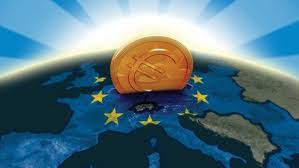The euro area’s economy loses momentum

ECONOMISTS have spent the past decade wringing their hands over the health of the euro area’s economy. Last year, in a welcome respite, it expanded by a robust 2.3%, outstripping forecasts and matching America’s growth rate. But it has appeared less rosy-cheeked since.
Symptoms include moderation in a number of monthly indicators. Industrial production fell in January and February, as did business confidence; retail-sales growth was disappointing. The purchasing managers’ index (PMI), an output survey regarded as a good early indicator of GDP growth, has fallen from exuberant—and perhaps unsustainable—levels at the turn of the year, though it still points to decent growth (see chart).
Germany, the bloc’s largest economy, has not been immune. A summary indicator compiled by the Macroeconomic Policy Institute, a German think-tank, which includes production, sentiment and interest-rate data, suggests that the probability of a recession has risen, from 7% in March to 32% in April. A measure of economic sentiment based on a survey of participants in financial markets by the Centre for European Economic Research (ZEW), another German institute, has fallen sharply.
Many analysts think that at least part of the explanation could be a range of temporary factors, the equivalent of a sniffle rather than a severe infection. A cold, elongated winter across the continent, and a nasty outbreak of flu in Germany, may have depressed production and kept shoppers at home. Some German output was probably lost in February, when members of IG Metall, a large trade union for industrial workers, went on strike. But if this told the whole story, the euro area’s economy should be bouncing back by now. Although the whole zone’s PMI stabilised in April, some surveys in Germany and France dipped a little further.
Demand may have been weighed down by other factors. The waning impact of the European Central Bank’s (ECB) quantitative-easing programme could be a candidate. But the central bank’s regular survey of banks suggests that its accommodative monetary-policy stance continued to translate into looser credit conditions over the past six months.
Another candidate is the stronger euro, which may have held back exports. Although much of its rise took place last year, economists at HSBC, a bank, point out that currency changes typically feed through to the trade figures with a lag. Consistent with that, the zone’s exports fell in February; sharp falls in the PMI measure of manufacturing-export orders also point to a loss in momentum.
Barring further strength in the currency, this too should eventually pass. A complication, though, is the risk of a trade war, given the importance of exports for the euro area, and particularly Germany. The fear of protectionism could explain why some forward-looking indicators of sentiment have turned down, says Achim Wambach of the ZEW, though it is unlikely to have affected the hard data yet.
The ECB, which was meeting to discuss monetary policy as The Economist went to press on April 26th, will be watching closely for signs of more persistent weakness. One risk is that the slowdown indicates less spare capacity in the economy than expected, with less room for above-trend growth. But with inflationary pressure still subdued across the euro zone, policymakers may not be too exercised. That said, the cyclical peak in growth may be past. As spare capacity is used up, most forecasters expect growth in the zone to slow gradually over the coming years, towards its long-run potential rate.
And here a more chronic problem surfaces. In its World Economic Outlook, released last week, the IMF opined that medium-term growth in the single-currency bloc was likely to be only 1.4%, “held back by low productivity amid weak reform efforts and unfavourable demographics”. The hand-wringing continues.
This article appeared in the Finance and economics section of the print edition under the headline “Catching a cold”





